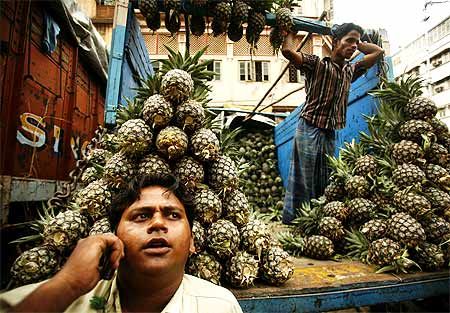
'Customers sign up with service providers with the understanding that they will get a satisfactory service'
'We must find out if Trai is using its existing powers properly'
The government plans to make available spectrum in bands like 2,100 MHz and 2,300 MHz, besides airwaves in the 700 MHz band.
A little less than a month after he took charge as the chairman of the Telecom Regulatory Authority of India, R S Sharma’s hands are full -- there are issues ranging from call drops to net neutrality and views on another round of spectrum auctioning.
Sharma tells Business Standard in an interview that Trai is planning to map the quality of service of all telecom operators through geographical information systems, to get the real picture.
Edited excerpts:
Call drops have increased in the past few months. The operators are citing a lack of telecom towers and spectrum constraints for this. How will aggrieved mobile users’ concerns be addressed?
We have issued a consultation paper on how customers should be compensated for call drops.
Customers sign up with service providers with the understanding that they will get a satisfactory service, but if there are disruptions and interruptions due to call drops or other issues, it is certainly not a healthy situation.
Customers deserve to be compensated for such inconveniences, which are not part of their contract.
This paper will essentially bring out proper methodologies for compensating people who are directly affected by call drops.
It will be better to compensate the affected party directly, rather than somebody paying to the regulator.
What is the actual reason for an increase in call drops?
We are in the process of diagnosing the problem of call drops. We are processing the data in Delhi and Mumbai to a granular level to identify potential reasons for call drops.
It is the issue of quality of service as a whole. While one problem is calls dropping, another is not being able to establish a connection.
So, the whole range of quality of services will be analysed and operators’ performance will be examined.
This will provide potential reasons with some amount of objectivity.
Also, we propose to establish a mechanism where we have a dashboard that can be drilled down to see quality of service at the ground level in that particular area/locality.
A quality-of-service map of the country -- a GIS-like map on how quality is being maintained -- will be prepared.
It will use a different data visualisation method with various statistics and graphs of each locality in a service area. An information paper related to this will be out shortly.
Do you think operators are not investing enough in infrastructure and there is over-capacity in their networks?
We will comment on this once we have secured full data.
Trai is deliberating on making it mandatory for telecom operators to disclose their network capacities periodically.
Also, according to available data, investments in infrastructure have not kept pace with the increase in mobile usage.
Prima facie, that operators are investing less in infrastructure appears to be one of the main reasons for call drops.
Will Trai seek more powers from the government to impose penalties directly on mobile operators?
It is too early to comment on this. Let me study how things are; we will look into the legal provisions.
But first let me see if Trai is using its existing powers properly.
The issue of whether or not we need more powers will come later.
Operators also complain about spectrum constraints. What are your views on it and how soon could we expect recommendations on pricing of spectrum for the next round of auctioning?
In the past, Trai has always maintained that more spectrum should be made available in different bands.
Currently, the government plans to make available spectrum in bands like 2,100 MHz and 2,300 MHz, besides airwaves in the 700 MHz band.
We are working on it.
OUT OF SYNC
According to Trai’s consultation paper on call drops, users’ minutes of usage (on GSM networks) grew 12 per cent between April-June 2013 and January-March 2015.
The increase in 2G data usage during this period was 106 per cent.
By comparison, the number of 2G-compliant base transceiver stations increased only eight per cent.
While growth in 3G data usage was 252 per cent, the number of nodes increased only 61 per cent during the same period.
Image: A pineapple fruit seller in Kolkata speaks on a mobile phone. Photograph: Jayanta Shaw/Reuters













 © 2025
© 2025